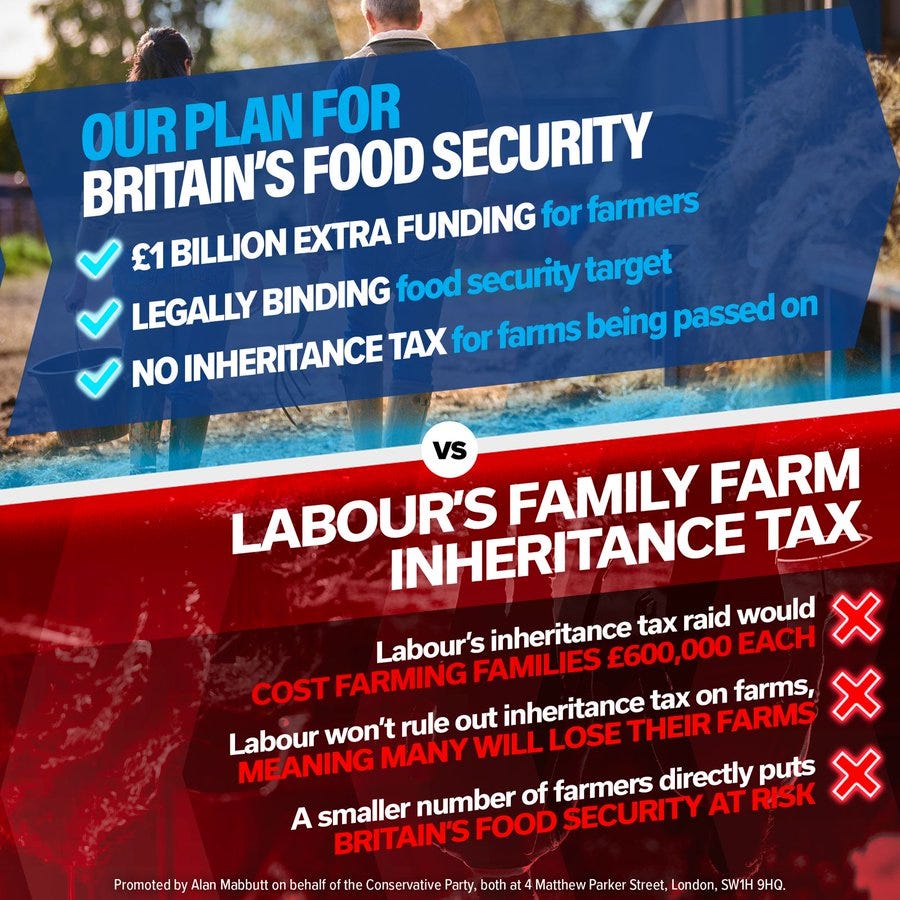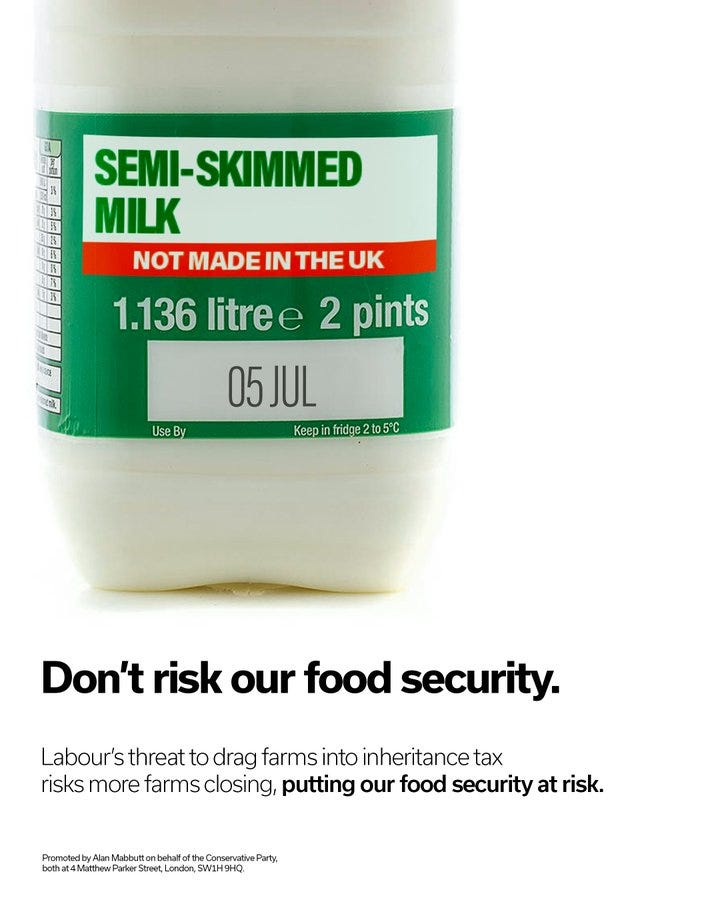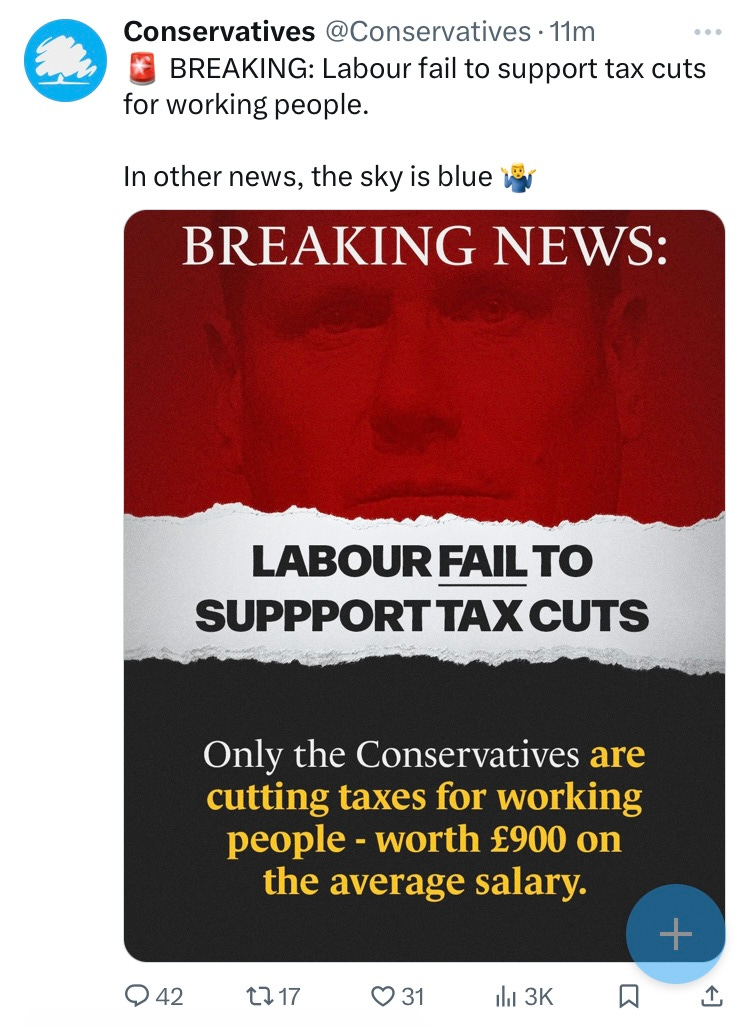Political parties only rarely delete their tweets. That’s partly because it’s pointless - people already have the screenshots - and partly because it involves an admission of failure. For example, the Conservatives have never deleted this tweet, ill-advisedly sent a year or so ago in reply to a story about a Labour policy change that everybody has forgotten about, even though it is an absolute gift for people to retweet every time the Conservatives do anything wrong, which is more or less every day.
It should have been profoundly obvious to someone in the party’s signoff chain, whether that chain was long or short, or quick or cumbersome, that even if the particular story they were responding to was bad for Labour, and even if the Tories were having a pretty good day that day (I honestly have no idea any more if they were), this tweet would come back to bite them because of how politics works: all parties have embarrassing stories sometimes, lots of people dislike the Tories and want to find ways to mock them, and this tweet is easy to take out of context and redeploy on a bad day for the purposes of mockery.
The graphic itself - the “0 days since last incident” text - is a broader meme that the Tories have repurposed, but its proximity to their own logo (not even to Labour’s logo, by the way, despite the fact that they want to use it to mock a Labour problem) makes it an easy screenshot and an easy gag. The fact that nobody said no to this is a big tell that the party’s internal processes were not up to scratch.1
Anyway. The current last incident zero days ago for the Tories is the very funny scandal around some of its own staff and candidates placing bets on the election date just before the election date was publicly announced, at a time when it looks at least possible that they were benefiting from insider knowledge.2 That was so bad that it led rapidly to something very unusual: the deletion of a tweet. It was this one, featuring a video of a roulette wheel, which has nevertheless been captured, shared widely and mocked anyway.
You’d say that this was bad luck rather than bad judgement - after all, the people responsible for the “don’t bet on Labour” attack video were not to know that one of their parliamentary candidates, Laura Saunders, and her husband Tony Lee, the Conservative Party’s director of campaigns, were about to be revealed to be under investigation by the Gambling Commission for allegedly placing bets on the election date - were it not for the fact that the scandal had already been underway for days and they probably should have noticed. It was a week earlier that Craig Williams, the Prime Minister’s Parliamentary Private Secretary, was revealed to have placed a £100 bet that the election would be held in July. Given that fact, I think I’d have advised CCHQ to steer clear of gambling-themed attacks on Labour.
They do still have other things to say. In my last post I wrote about the attacks the Conservatives are making on what they claim are Labour’s tax plans, which involve coming up with taxes Labour haven’t (in most cases) specifically ruled out raising, giving them catchy made-up names (the small business tax! The family homes tax!) and then sticking them on mocked-up posters. Well, looking at the tweets the Conservatives have not been forced to delete this week, they’ve got a new one: Labour’s family farm inheritance tax.3
They tweeted this with the caption “If you are a farmer, there is a clear choice at this election”. Another tweet on the same theme refers to “your family’s farm”. Now, Twitter, as they say, is not Britain. And just because something on Twitter is not for you, that doesn’t mean it doesn’t have an audience. Farmer Twitter may not be as big as Football Twitter, say, but I’m sure there are farmers who are routinely scrolling through their feeds with one hand while feeding their sheep with the other. My family does not have a farm, but maybe yours does. However, with so little time left until the election, it is surprising to me that the Conservative Party’s main Twitter account is focusing so hard on messages predicated on “If you are a farmer”.
After all, the conventional wisdom is that farmers already overwhelmingly vote Conservative. And we can say with even more certainty - this is not mere conventional wisdom - that farmers overwhelmingly live in rural constituencies, because those are the ones you can fit farms into, and that rural constituencies are overwhelmingly held by the Conservatives with significant majorities. If they are trying to shore up their farmer vote, with messages which amount to “Hey, farmers, don’t vote Labour, they might tax you more”, on a platform which is mostly used by non-farmers for whom this is not the most persuasive possible message, then… well, then they’re in deep, deep trouble.
This is not the only farmer-focused tweet they’ve put out in the last few days. There are at least four more, with graphics like this one, whose message is tenuous to say the least.
And historically safe Conservative seats with lots of farmers in them are also where Rishi Sunak has been spending a lot of his time during the campaign. Several news outlets have analysed where the party leaders are doing their campaign visits, on the sensible grounds that that gives a decent indication of where the parties think the battleground is: you send your leader to the target seats you think a visit might help you win, or the defensive seats you think a visit might help you hold. You don’t send your leader to seats you’re going to win anyway, or seats you haven’t got a hope of winning. Visits show you where the edge is, or at least where the parties think it is.4 Rishi Sunak is increasingly being deployed in what are on paper very safe seats, including eight so far with majorities of over 20,000.
Earlier this week, Sunak was in North Devon, somewhere he would not have had to go if the election were going at all well, and was filmed trying to feed some sheep who tried to run away from him, something they would not have done if the election were going at all well. I do not intend to damn Labour’s digital team with faint praise when I say that they are very good at shooting fish in a barrel, but the Conservatives have been giving them a lot of barrels of fish, and they are not missing. Here’s their video.
Less than two weeks from polling day, the underlying dynamics have got worse for the Tories, not better. The polls have not really moved, when the Tories badly need them to. The manifestos, a potential route to changing the story, don’t appear to have changed the story. The TV debates have been like most TV debates in most elections, which is to say a non-event. Nigel Farage’s entry into the election may or may not affect the final result, but it has affected the coverage, creating a subplot that is more interesting to much of the media than the question of whether Labour will win. Labour have somehow managed to move over the last three years or so from being too uninteresting to cover because they’re not going to win anyway and their leader is a bit dull to being too uninteresting to cover because they’re going to win by miles anyway and their leader is a bit dull. And the combination of the betting scandal and Rishi Sunak’s decision to come home early from the D-Day commemorations has shifted the fundamental electoral dividing line: it used to be “It’s time for a change” versus “Stick with the plan”; now it’s “It’s time for a change” versus “I’m incredibly angry with the behaviour of my colleagues and so far as my own actions are concerned, I just hope you can find it in your hearts to forgive me”.
We already knew that the Conservatives’ campaign was not going very well. But if we knew nothing else, the very fact that they are targeting farmers - farmers! - would tell us everything we need to know. Is this a campaign that thinks it has a chance? I wouldn’t bet on it.
Sometimes tweets get deleted not because of politics but simply because of a typo, like this one from March which is evidence of a different kind of signoff problem: it’s not that there’s nobody in the chain with decent political judgement, it’s just that nobody gave it a proper proof-read before saying yes.
Everyone makes typos sometimes, which means that spelling-based attack is best avoided.
I am not a betting man, and have only once placed a bet on a political topic: this one, which was not based on inside information but on the knowledge that, given the way MPs behave in the House of Commons, it was an absolute dead cert.
There is also a reference to political betting on pages 93-94 of Punch & Judy Politics, the book Ayesha Hazarika and I wrote about Prime Minister’s Questions, which you should buy if you haven’t already bought it:
For a while, at least one bookmaker offered odds on the topic Ed Miliband would choose for his questions to David Cameron. In the prep room we half-seriously suggested putting a substantial amount of the Labour Party’s money on a long-odds obscure topic, then asking about it, in order to fund Labour’s election campaign. It might have been the justification Ed needed for his long-held, never-fulfilled ambition to ask about the abolition of the Agricultural Wages Board. We remain unsure about whether the bookies would have paid out if they had found out we’d done this, and indeed uncertain about the ethics of doing it if we could have got away with it. We never tried.
I should probably say, in the current climate, that “half-seriously” is a jokey overstatement of the position and that it was not serious at all, but in any case “we never tried” is the most important point here.
Like other Tory accusations about Labour tax rises, this is based on a claim that if something is not specifically ruled out in Labour’s manifesto then Labour is definitely going to do it. Labour’s manifesto does not say anything about retaining agricultural property relief for inheritance tax, and it also does not say anything about getting rid of agricultural property relief for inheritance tax. For the Tories, this is enough to justify describing it as a planned £1bn tax raid on farmers which will leave the average family farm facing a bill of £600,000. For balance, it is worth pointing out that Labour’s line on this claim is that it is “desperate nonsense”.
You can also see where parties think the edge is from where staffers are sent in the final stages of the campaign, although this is not generally public domain information. In 2010, as a staffer in Labour HQ, I was deployed to Thurrock in the last few days before the election. The Conservatives won it by 92 votes, which was frustrating but also evidence that the people responsible for identifying the Labour-held seats with the tightest margins, where additional capacity could make a difference, were absolutely spot on.









Thanks, Tom. As an avid politics-watcher, and writer, I'm fascinated with how people use manguage and messaging to move public opinion. I have to applaud (although I still twitch) the Take Back Control slogan - classic 3 words, imparts a message without hitting you over the head with it. Really great show not tell.
Labour's campaign has been excellent. It's just a shame that the relentless lying of Tories, and the current fad for "would you rule out, here and now" gotchas from journalists, means that much Labour airtime is denying the lies and slurs from the Tories.
And we're stuck in media and social media-driven dichotomy - Starmer (on Question Time this week) patiently trying to provide detail and relevance for policies against a backdrop of "we don't know what he stands for" and "Labour aren't providing any details, then immediately afterwards gets criticised by Jon Craig on Sky for being "long-winded at times."
The sooner we can move away from the gesture and popularity politics of Johnson (where everything needs to be distilled down into a 1-minute clip for social media, with some arm waving thrown in) the better. Running a government, and a country, is difficult at the best of times. I've lost count of the number of issues Starmer gets asked asked about "because they're very important for our audience."